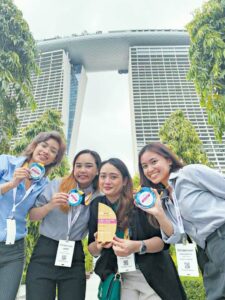Students from Enderun Colleges emerged as the champion in the Planet Protectors Higher Education League at the EDUtech Planet Protectors Sustainability Challenge, making them the only Filipinos to reach the top three finalists.
Singapore Polytechnic took 2nd Runner-up, followed by the Institute of Technical Education (Singapore) as 1st Runner-up.
Enderun’s groundbreaking project, Rubbish Reborn, was led by BSBA Sustainability Management students Maria Angelica Candava, Victoria Castro, and Janis Tan, under the mentorship of Mhyles D.G. Oliva, director of academics and head of the Sustainability Management Program. The initiative focused on innovative waste management solutions designed to close the loop and support the school’s commitment to achieving zero waste.
Presented at the event held on Nov. 6-7 in Singapore, this achievement not only showcased their innovative approach but also positioned Enderun Colleges at the forefront of sustainability efforts in education.
The team shared 2022 United Nations Development Programme (UNDP) data showing a steady rise in the country’s solid waste. Enderun’s campus alone contributes around 10,000 kilograms of paper, plastic, and food waste each year, prompting a key question: Where does all this waste go?
In their sustainability classes, the team gained critical insights into the adverse impacts of the linear economy model, in which finite resources are extracted, transformed into products, and ultimately discarded in landfills. This realization proved to be a pivotal moment.
“This linear approach rapidly depletes natural resources, pollutes ecosystems, and neglects the essential need for long-term sustainability,” Ms. Candava explained.
It was compelling to ask: “What will happen when these resources are entirely depleted?” The answer, they realized, lies in a shift toward a circular economy — a system designed to reduce waste, reuse products, and restore nature.
Inspired by the growing need for sustainable practices, the team set out to develop an innovative solution that could transform Enderun’s waste management practices and contribute to a more sustainable future.
The team’s groundbreaking project, Rubbish Reborn, revolves around two key models for waste management, focusing on the segregation of paper, plastic, and food waste on campus. The aim is to not only reduce waste but also reuse it in a way that supports the school’s commitment to achieving a zero-waste goal by 2027. In effect, Enderun’s waste will ultimately return to campus in a new, reusable form through sustainable partnerships.
The first model under the project involves the recycling of paper and plastic products used on campus. “These items often end up in landfills, but we’ve found a way to give them new life,” said Ms. Castro. Partnering with Green Trident, a waste collection and sorting partner, the team is now able to connect with recycling companies like Papel ni Juan and Poly al Pro boards. These partnerships allow them to turn paper and plastic waste into eco-friendly products, such as 100% recycled paper for office use and eco-boards for building campus furniture.
“This process enables us to not only reduce waste but also create valuable resources that can be used on campus again,” Ms. Castro added. “It’s a prime example of the circular economy in action.”
The second model targets food waste, a significant contributor to landfill volume. Through their innovative research on Black Soldier Flies (BSF), the team has developed a process to bioconvert food waste into valuable byproducts. BSF larvae are used to convert food scraps into organic feedstock, which is then donated to local farmers in exchange for organic produce for Enderun’s cafeteria.
“The idea behind this is twofold: reduce food waste going to landfills and create a sustainable, mutually beneficial relationship with local farmers,” explained Ms. Tan. “We’re not just dealing with waste; we’re transforming it into something productive that supports our local community.”
By 2027, Enderun Colleges aims to reintegrate nearly 100% of the waste produced on campus into the circular economy. The team is already seeing promising results, with projections showing a 60% reduction in waste going to landfills, a 50% reduction in dependence on natural resources, and a 40% cost reduction in waste management expenses — cutting annual costs from P864,000 to just P500,000.
“Even with the costs of our BSF setup (P5,000) and Green Trident pickups (P504,000 annually), sustainability doesn’t have to be expensive,” said Ms. Tan. “In fact, these investments in sustainability not only save money but also open the door to more sustainable projects in the future.”
The Rubbish Reborn project represents more than just a waste management solution — it’s a testament to the power of innovation, collaboration, and forward-thinking leadership. Through their project, Misses Candava, Castro, and Tan are not only contributing to Enderun’s sustainability goals but are also setting a powerful example for other institutions to follow.
“This experience taught me the challenges of presenting at a convention,” Ms. Castro shared. “Manning our booth prepared me for the finalist keynote stage and helped me build confidence in front of an audience. Engaging with convention attendees highlighted the extensive behind-the-scenes work required to make our project successful, from logistics to execution.”
“Our sustainable waste management plan for Enderun was ready to launch, and unveiling it on an international stage was a strategic choice and a profound experience,” Ms. Oliva shared. “The event’s timing, our team’s synergy, and the sustainability themes in our project were meant to be. I had complete confidence in my team’s dedication; they not only met our vision but exceeded it with meticulous research and a dynamic presentation. We’re excited to bring this vision to life on campus, and I couldn’t be prouder of my incredible sustainability management team!”






